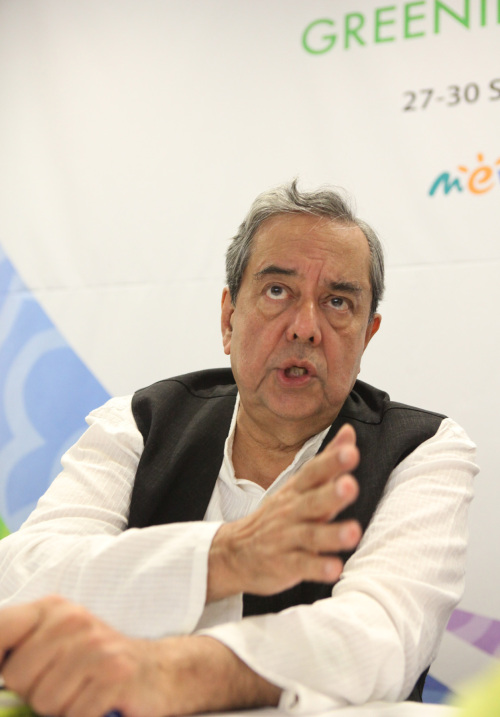Chief of world’s largest environmental network warns on ‘exporting problems’
Dark clouds gathering over the world economy are an ominous sign for environmental conservationists, because when the economy is bad, governments tend to toss environmental issues on the backburner.
However, Ashok Khosla, president of the International Union for Conservation of Nature, urges government policymakers around the world to look beyond the current financial crisis and keep a long-term perspective.
“The current problem has originated from some banks behaving poorly. But you see, economic crises are happening more and more because of the prices of oil, trade restrictions and the collapse of fisheries and so on,” Khosla said in a recent interview with The Korea Herald.
Dark clouds gathering over the world economy are an ominous sign for environmental conservationists, because when the economy is bad, governments tend to toss environmental issues on the backburner.
However, Ashok Khosla, president of the International Union for Conservation of Nature, urges government policymakers around the world to look beyond the current financial crisis and keep a long-term perspective.
“The current problem has originated from some banks behaving poorly. But you see, economic crises are happening more and more because of the prices of oil, trade restrictions and the collapse of fisheries and so on,” Khosla said in a recent interview with The Korea Herald.

The biggest crisis from the public’s point of view was food prices and shortages, he pointed out, which stemmed from climate change.
“It would be a big mistake to pull away from environment amid this trend.”
Khosla was here to attend the IUCN Regional Conservation Forum, which opened Tuesday in Songdo, Incheon, for a four-day run.
The meeting is a preparatory gathering of IUCN representatives from Asia and the Pacific region to discuss and formulate the agenda for a bigger gathering on Jeju Island in September next year.
The IUCN World Conservation Congress is the biggest and the most important event for environmentalists around the world, often linked to an Olympiad because it is held every four years.
In next year’s congress, over 10,000 representatives of governments, non-governmental organizations, United Nations agencies, industries and academia are expected to attend.
It would be the biggest in the IUCN history, Khosla said.
“It is big, not just in terms of the number of people (expected to participate), but because it comes at a time when the world is in real trouble,” he said.
The IUCN will do its best to send message to the world, particularly to governments, that we need to take a strategic long-term view on the productive capacity of environmental resources.
“After all, they are the only asset we have,” he said.
Khosla, noting Korea’s transformation from poverty to economic prosperity, said that the country could do more as a balancer between developed and developing countries on pressing environmental issues as it did within the framework of the Group of 20.
“Its desire (to play such a role) is obvious. But whether it has actually succeeded yet or not, I think, is a bit early to tell,” he said.
Providing help to poor countries on the use of advanced techniques on environment planning would be good, but what’s more important, and often go neglected, is not exporting the problems of their own making to poor countries, the president said.
“Korean growth has been material-intensive. You import steel, metals and a lot of stuff. Despite high forestation rate here, Korea imports almost all the wood it uses,” he said.
“That means you use forestation somewhere else. You can’t export your problems for very long, without paying the price,” he said, reminding the country of the Yellow Dust from China that blankets the Korean Peninsula every spring.
An Indian native, Khosla was elected president of IUCN in October 2008.
The IUCN is the world’s oldest and largest environmental network of governments, NGOs including almost 11,000 volunteer scientists.
By Lee Sun-young (milaya@heraldcorp.com)






![[From the Scene] Monks, Buddhists hail return of remains of Buddhas](http://res.heraldm.com/phpwas/restmb_idxmake.php?idx=644&simg=/content/image/2024/04/19/20240419050617_0.jpg&u=20240419175937)





![[Graphic News] French bulldog most popular breed in US, Maltese most popular in Korea](http://res.heraldm.com/phpwas/restmb_idxmake.php?idx=644&simg=/content/image/2024/04/18/20240418050864_0.gif&u=)


![[From the Scene] Monks, Buddhists hail return of remains of Buddhas](http://res.heraldm.com/phpwas/restmb_idxmake.php?idx=652&simg=/content/image/2024/04/19/20240419050617_0.jpg&u=20240419175937)

![[KH Explains] Hyundai's full hybrid edge to pay off amid slow transition to pure EVs](http://res.heraldm.com/phpwas/restmb_idxmake.php?idx=652&simg=/content/image/2024/04/18/20240418050645_0.jpg&u=20240419100350)

![[Today’s K-pop] Illit drops debut single remix](http://res.heraldm.com/phpwas/restmb_idxmake.php?idx=642&simg=/content/image/2024/04/19/20240419050612_0.jpg&u=)